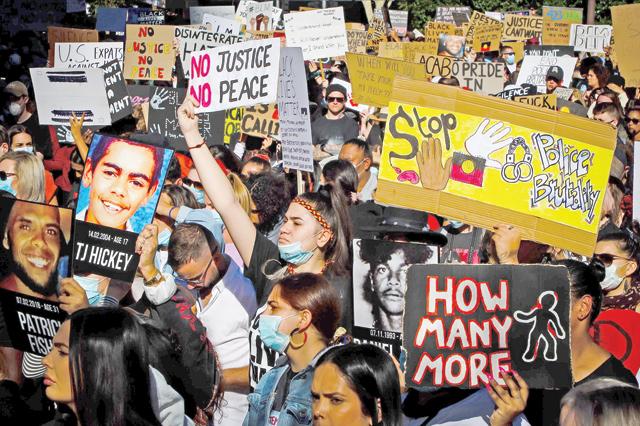- International News
- Sun-2020-06-07 | 03:37 pm

Marchers in Sydney, Melbourne and elsewhere rejected arguments from law enforcement and conservative leaders that mass protests could fuel the spread of coronavirus.
A court on Friday declared the Sydney protest illegal on health grounds, although the ruling was overturned by an appeals court minutes before the march was due to start.
"The fact that they have tried to push us all back and stop the protest, it makes people want to do it even more," said Jumikah Donovan, one of thousands who turned up thinking the ban was still in place.
The Sydney march of at least 20,000 was largely peaceful but as night fell a smaller group of a few hundred protesters faced-off with police over two hours.
A large number of police eventually forced them into a nearby railway station where a tense stand-off ended with police using pepper spray on the crowd.
Police confirmed only three arrests during the rally.
Demonstrators brandished signs that read "I can't breathe", a nod to the last words of African-American man George Floyd, whose death while being arrested has sparked civil rights protests around the world.
Another read: "Same story, different soil."
The movement has resonated strongly with many in Australia — a country also wrestling with the legacy of a racist past.
Organisers said they hoped to draw attention to high imprisonment rates among Aboriginal Australians and the large number of deaths in custody of indigenous people — more than 400 in the last three decades.
No prosecutions have been brought despite dozens of investigations, inquests and in some cases video evidence of abuse.
'Voice for change'
Many of the protesters wore face masks, brought hand sanitiser and tried to social distance as best they could.
"There are things in the world that need to be addressed," said Fay Goli. "If a majority can stand together, there will be a stronger voice for change."
Australia has seen a sustained drop in the number of COVID-19 cases, but social distancing rules remain in force and mass gatherings are not permitted.
"Police are prepared for anybody that wants to just flout the law," New South Wales Police Minister David Elliott told media before the rallies.
Protesters in Melbourne were warned they could face fines for attending a rally if social distancing was not observed, although police appeared not to be enforcing those rules.
The day before the protests Prime Minister Scott Morrison had urged people to stay home.
"Let's find a better way and another way to express these sentiments rather than putting your own health at risk," Morrison said.
He admitted there was more to be done to address indigenous inequality, but rejected parallels with the United States.
"Let's deal with this as Australians and not appropriate what's happening in other countries to our country at this time," he said












